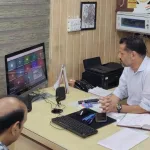Moved with the bad condition of water bodies, a group of students along with their mentor have made a biomedicine to save the water bodies from dying a silent death.
Studying in class 12th in Srinagar’s Tyndale Biscoe School, Mohammad Umar Sahibzada, Mohammad Haaziq and Dayan Sabeel Mir, under the mentorship of Dr. Irfan Ali, have made this project in their school laboratory.
Srinagar has been famous for its water bodies and over years, these water bodies including the famous tourist attraction, Dal Lake has been losing sheen due to the growing pollution. The discharge of untreated sewage and wasteby people into the lakes has caused excessive weed growth, posing a serious threat to aquatic biodiversity.
The idea to conserve Dal Lake and other water bodies came up after a lot of research by the team.
One of the group members, Mohammad Umar Sahibzada while talking about the composition of the biomedicine said that it contains copper sulphate, sodium bromide and other chemicals which can be used to kill the waste particles but at the same time, doesn’t harm the aquatic life.
He said, “The components of the biomedicine absorb most of the ammonia and nitrogen present in the water along with the suspended matter. It decreases the nitrate and ammonia levels of water and makes the water translucent. The medicine also kills the harmful weed and algae which produces toxins.”
The high concentration of components like ammonia and nitrate causes the eutrophication/ biomagnification in the water bodies resulting in algae bloom and dead zones. Eutrophication poses a threat to portable drinking water sources and fisheries.
With the biomedicine made by the team, the ammonia, nitrogen, dead algal and other plant matter sinks at the bottom of the water bodies. The special varieties of fish like Hypostomus Plecostomus and Corydoras can be released in the water bodies which can feed upon the matter settled at the bottom.
“The organic matter at the bottom acts as a fodder for the fishes so within no time they will consume most of the waste in the waterbody,” he added.
Sahibzada further said that the remaining algal wastes which could not be consumed by the fishes can get netted out and mixed with Bono meal to make manure and also can be added with worm meal to make food for birds and livestock.
He said that while performing the experiment in the school lab, the water after treatment, not only regains its transparency but also loses its stinky odor.
Recently the team has been selected for the National Children Science Congress, a forum for children to present their creativity, innovativeness and their capabilities to solve the problems of society using the scientific methods.
The team is hopeful that after the final testing, they will approach government authorities with their project to conserve the lakes and waterbodies.
While talking to Rising Kashmir, their mentor, Dr. Irfan Ali, a limnologist, said that the project pertaining to the cleanliness of the lakes and biodiverse has a huge scope as many water bodies are under the environmental stress, affecting the zooplankton and phytoplankton.
“The plants and animals inside the water bodies are microscopic and their population is declining. In the past, I have researched on Dal Lake. I along with the team of researchers and scientists tried to develop a sustainable development project so that their life can be sustained,” he added.
The plan was submitted by the team of researchers to the government which resulted in the installing of fountains in the Dal Lake that increased the level of oxygen demand in the water bodies so that the pollution can be reduced.
He said that there is a need to act timely to curb the increasing pollution in aquatic biodiversity.
Dr. Irfan, who has been teaching in the school for more than 20 years, said that the group of students is highly interested in limnology and wants to make a positive change in the environment with their efforts.
The project was presented by the students during the recently held ROSHNAAS-22, the inaugural edition of annual TechFest organized by Institute of Technology, University of Kashmir where students of various schools, colleges and universities came together to showcase their projects and also interacted with the experts.
Concerned over deterioration of waterbodies, Kashmiri students made biomedicine to save aquatic space
Leave a Comment Leave a Comment





